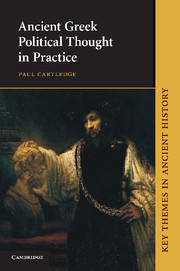Book contents
- Frontmatter
- Contents
- Preface
- Acknowledgements
- Timeline
- CHAPTERS AND NARRATIVES
- 1 Meaning in context: how to write a history of Greek political thought
- 2 The Greek invention of the polis, of politics and of the political
- Narrative I The prehistoric and protohistoric Greek world, c. 1300–750 BCE
- Narrative II The archaic Greek world, c. 750–500 BCE
- Narrative III The classical Greek world I, c. 500–400 BCE
- Narrative IV The classical Greek world II, c. 400–300 BCE
- Narrative V The Hellenistic Greek world, c. 300–30 BCE
- Narrative VI ‘Graecia capta’ (‘Greece conquered’), c. 146 BCE – CE 120
- APPENDIX I Selected texts and documents
- APPENDIX II The ‘Old Oligarch’: a close reading
- Bibliographical essay
- References
- Index
Preface
Published online by Cambridge University Press: 05 June 2012
- Frontmatter
- Contents
- Preface
- Acknowledgements
- Timeline
- CHAPTERS AND NARRATIVES
- 1 Meaning in context: how to write a history of Greek political thought
- 2 The Greek invention of the polis, of politics and of the political
- Narrative I The prehistoric and protohistoric Greek world, c. 1300–750 BCE
- Narrative II The archaic Greek world, c. 750–500 BCE
- Narrative III The classical Greek world I, c. 500–400 BCE
- Narrative IV The classical Greek world II, c. 400–300 BCE
- Narrative V The Hellenistic Greek world, c. 300–30 BCE
- Narrative VI ‘Graecia capta’ (‘Greece conquered’), c. 146 BCE – CE 120
- APPENDIX I Selected texts and documents
- APPENDIX II The ‘Old Oligarch’: a close reading
- Bibliographical essay
- References
- Index
Summary
‘The next remove must be to the study of politics; to know the beginning, end, and reasons of political society.’
(John Milton, ‘Of education’, 1644)John Milton was born almost exactly 400 years ago as I write this preface. Paraphrasing Wordsworth, I should say that his spirit at least is still living at this hour. A powerful renascence is currently under way in the practice of political theory and the study of its history, as an academic subject lying on the interdisciplinary margins between philosophy, history and social thought. Within the frame of this academic renascence and the pragmatic political concerns associated with it, the Greeks' pioneering and fundamental role in the Western political tradition is universally recognised. General books on democracy typically start with a ritual obeisance to the ancient Greeks; a few (Dunn 2006, for conspicuous example) even attempt to do something like justice to the ancient Greeks' – very different – kind of democracy. Newer still is the reappraising of the potential contemporary reference and relevance of ultimately Greek ideas, especially those of democracy, with its axiomatic components of freedom and equality (see in particular Barber 1984, Euben, Wallach and Ober 1994, and chapter 11, below). For political theory can entertain also the legitimate ambition to affect the world outside the academy (e.g. Held 1991; Tuck 1991).
- Type
- Chapter
- Information
- Ancient Greek Political Thought in Practice , pp. xi - xivPublisher: Cambridge University PressPrint publication year: 2009



